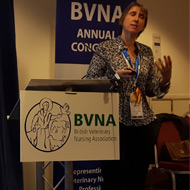VNs discuss future of common parasites

Practice support advisor Joy Howell spoke at BVNA Congress.
"You have to do more to protect your animal than is required for the passport restriction," so said Joy Howell at BVNA Congress in Telford.
Speaking in the SQP stream on Saturday (8 October), Ms. Howell - a practice support advisor - stressed the PET Travel scheme is in place to protect human health, and therefore we should be doing more than is required to protect pets from disease.
After reviewing some of the common parasite challenges found in small animal practice today - including leishmaniosis, heartworm, and erhrlichiosis - Ms. Howell said the best option is to try and avoid the animal becoming infected in the first place.
She suggests VNs have protocols in place so they can advise owners on how to prevent disease. The ESCAPP website is a particularly useful resource, as it contains pdf protocols that can be downloaded and personalised with your practice logo.
Ms. Howell also suggests practices set up travel clinics, where owners can learn about parasites and how they can prevent disease before they go away.
Concluding the lecture, Ms Howell spoke about tapeworm infected farm dogs and how they could be responsible for sheep carcass rejection - an issue that cost the farming industry an estimated £5 million in 2012.
"Responsible pet ownership is about protecting farmland as well," she said. "Worm all dogs in the property. Any sheep meat fed to farm dogs must be properly cooked or frozen, and don't allow dogs on farms unless they have been correctly wormed," she concluded.
For more information about vector-borne diseases visit the canine vector-borne disease website at www.cvbd.org.



 The Federation of Independent Veterinary practices (FIVP) has announced a third season of its podcast, Practice Matters.
The Federation of Independent Veterinary practices (FIVP) has announced a third season of its podcast, Practice Matters.